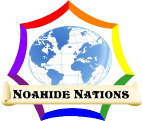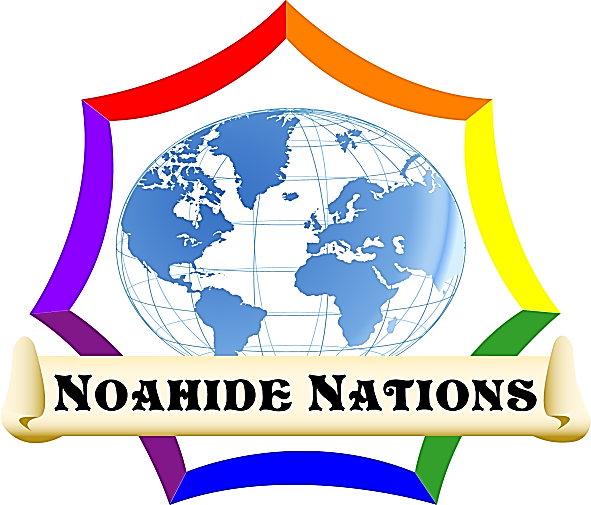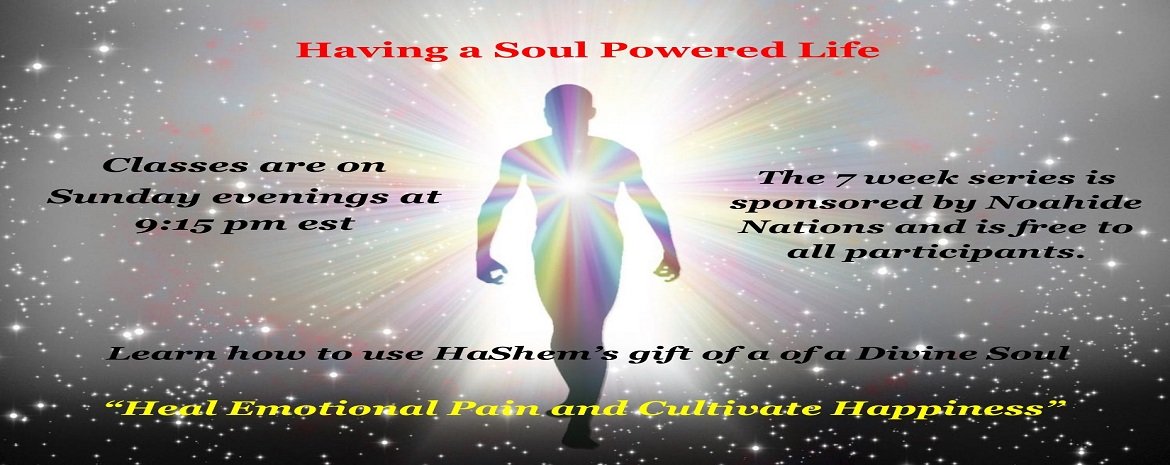
Noahide Torah Courses
Noahide Nations has conducted nearly 3000 live online Torah classes over the past 15 years. Many of these classes are available in audio recordings. Here are just some of these courses.
God's Instructions
When God created man on the 6th day He wanted mankind to live in peace and harmony, through His Mercy. He gave Adam 6 instructions in order to live this way. After the flood He gave Noah a 7th. These are the Noahide Commandments.

Read More +
Noahide Prayer
For Noahides, prayer is considered a mitzvah when performed in response to personal needs or circumstances.

Read More +
Develop a Torah Personality
Help for perfecting your relationship with HaShem and yourself.

Read More +
Listen To Noahide Laws & Life Cycle Class
Listen to the overview from a previous class from the Noahide Torah Study Yeshiva Course.

Read More +
Seek Torah Wisdom
Torah wisdom should always flow through you. Learn about Hashem and you will learn about yourself!

Read More +
After The Flood
Ever wonder what happened when Noah and his family exited the Ark after the Flood?
Wisdom From Pirke Avot
Simon the Just…used to say,
“Upon three things the world stands:
On Torah, on (Divine) Service, and on Deeds of Lovingkindness.”
Pirke Avot 1:2
Ben Zoma said,
“Who is wise? The one who learns from all people…
“Who is mighty? The one who subdues the evil inclination…
“Who is rich? The one who rejoices in his portion….
“Who is honored? The one who honors other human beings….”
Pirke Avot 4:1
The Most Important Part of Studying Torah
The most important element in validating interpretations of the written and oral Torah is the concept of Mesorah. Mesorah is the greatest proof to the authenticity of any concept, practice, or interpretation.
Although the seven Noahide laws have their origins in Adam and Noah, God chose to transmit and preserve them via Moses and the giving of the Torah at Sinai. This placed the Seven Mitzvos within the structure and system of Torah study and learning. Therefore, the seven Noahide laws must be interpreted and understood within the context of the Torah.
This point cannot be stressed enough: Jewish, and therefore Noahide, study and interpretation of the Torah is unique and unlike the study of any other religious texts.
The Truth About the Ger
Don't ever be afraid of seeking truth or speaking the truth, as it says in
Proverbs 12:19...
Truthful lips will be established forever, But a lying tongue is only for a moment
Are Noahides Allowed to Pray?
For Noahides, prayer is considered a mitzvah when performed in response to personal needs or circumstances. If one experiences challenges for which he does not pray, his lack of response is tantamount to a denial of God as the sovereign ruler of all things and all events. When one does pray in such circumstances, it demonstrates reliance and belief in the Creator.
When a Noahide prays to give thanks or praise absent a personal need, he still receives reward for such prayer even though it is not of the same nature as prayer prompted by personal needs.
As with all personal prayers, there are no fixed texts for Noahide prayer. Since all Noahide prayer is essentially personal prayer, it is ideally expressed using sincere words from the heart.
Tools For Noahide Torah Study
The journey of Noahide Torah study is endless in depth and has no destination. You will realize this when your very essence proclaims, "the more I learn, the less I know"! Before you make this proclamation remember that it is a mitzvot for a Noahide to study the Noahide Laws and apply them in every aspect of their life. After you make that proclamation you will realize and appreciate why it is a mitzvot for a Noahide to study the Noahide Laws and apply them. The study of Torah is what gives us our awe of the Creator. The more we study the more awe we gain.
Al Chet 11
- Category: Al Chet (Confession)
- Hits: 3526

Exploring the Al Chet Prayer
Rabbi Shraga Simmons
11. For the mistakes we committed before You through insincere confession.
On Yom Kippur when we say each line of the "Al Chet" prayer, we gently strike our heart -- as if to say that it was "passion and desire" that led to these mistakes. Do we really mean it?
Ask yourself:
Did I ever apologize without being sincere?
Have I committed myself to "change" without seriously following up?
Al Chet # 11
44 Roots of Mistakes
by George Brock
The Sin: The Mistakes we committed before You through insincere confession.
- Giving apologies- without being sincere.
- Committing to change- without following up.
The Battle: Is- (1) Change {vs} Staying the same.
(2) Sincerity {vs} Insincerity.
The Cause: The more the “insincere” say; they have changed- the more they stay the same.
The Victory: Comes when one recognizes the need to change- he embraces it and lets the sin go.
- Sometimes one must “Cut off the finger to save the hand” and live in peace.
The Mistake: (“Giving apologies- without being sincere”.)
Victory:
The victory comes when one realizes- “Activity” is not “Productivity”. The goal of repentance is to show “remorse” and being truly “ashamed” of one's mistakes.
- One should ask God- for the inner strength and courage to do what is right and to avoid
making the same mistakes in the future.
The Mistake: (“Committing to change- without following up”.)
- “Some drink from the fountain of T'shuvah- others just gargle”.
The Goal: Is to ask God- to help one to “understand” that everything that happens in one's life-is the product of God's will and personal intervention.
“One should ask God to help one-
- Observe what God is trying to teach him.
- Interpret the lesson being taught and improve.
- Implement the corrections in one's life.
Which would in turn cause one to achieve one's soul correction- which only comes through practicing “Sincere T'shuvah” before God”.


 French (FR)
French (FR)  English (UK)
English (UK) 

























 Choosing a Rabbi
Choosing a Rabbi What Is Tzedakah?
What Is Tzedakah? The Science in Torah
The Science in Torah Why Study Torah?
Why Study Torah? Afterlife, Moshiach & Redemption
Afterlife, Moshiach & Redemption Your Soul
Your Soul